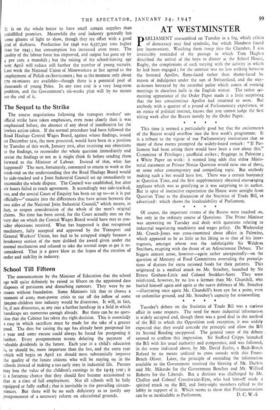The Sequel to the Strike
The course negotiations following the transport workers' un- offidal strike have taken emphasises, even more clearly than it was emphasised before, the absence of any shred of justification for .he lawless action taken. If the normal procedure had been followed the Road Haulage Central Wages Board, against whose findings, issued on December 31st, the men protested, would have been in a position by Tuesday of this week, January 21st, after receiving any objections to the findings, to reconsider the whole question immediately and revise the findings or not as it might think fit before sending them forward to the Minister of Labour. Instead of that, what has happened? The men, fortunately, consented to return to work at the week-end on the understanding that the Road Haulage Board would be side-tracked and a Joint Industrial Council set up immediately to reconsider the whole dispute. The Council was established, but after six hours failed to reach agreement. It accordingly was side-tracked, too, and the special Court of Enquiry has been set up to—as it is put officially—" enquire into the differences that have arisen between the two sides of the National Joint Industrial Council," which means, in fact, to reopen consideration of the whole of the men's original claims. No time has been saved, for the Court actually met on the very day on which the Central Wages Board would have met to con- sider objections received. What has happened is that recognised machinery, fully accepted and approved by the Transport and General Workers' Union, has had to be scrapped simply because a breakaway section of the mew disliked the award given under the normal mechanism and refused to take the normal steps to get it re- considered. That is a grave blow to the hopes of the creation of order and stability in industry.


































 Previous page
Previous page